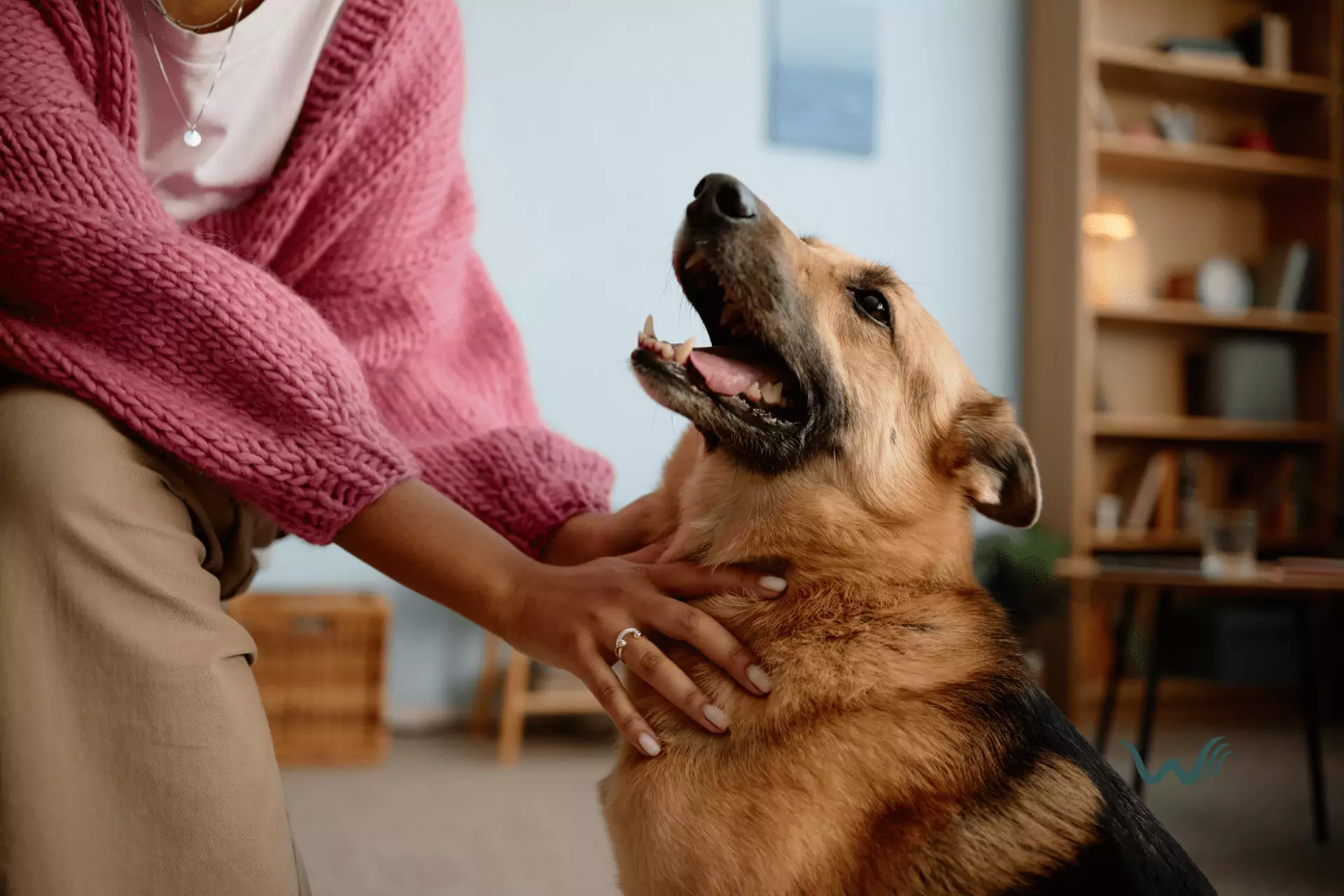

The Joys Of Having A Golden Retriever As A Service Dog
by Haley Mills
Last updated: April 20, 2024
Verified and Approved by:
Angela Morris,
MSW, LCSW
Fact Checked

Golden Retrievers are widely known for their friendly and gentle nature, making them one of the most popular breeds for service dogs. Their versatility and intelligence make them well-suited for various roles, including assistance with physical disabilities, emotional support, and therapy work.
In this article, we will explore the joys of having a Golden Retriever as a service dog, discussing their training and certification process, as well as the many ways they can enhance the quality of life and independence of their owners.
Golden Retrievers are highly sought after for their exceptional trainability and adaptability. These intelligent canines undergo rigorous training and certification processes to perform their duties effectively. From assisting individuals with physical disabilities by retrieving dropped items or providing stability, to offering emotional support and therapy work, Golden Retrievers are capable of providing a wide range of services.
Their calm and intuitive nature allows them to sense and respond to their owner’s needs, making them invaluable companions for those in need. Join us in the world of Golden Retrievers as service dogs and discover their remarkable impact on their owners’ lives.
Key Takeaways
- Golden Retrievers are popular breeds for service dogs due to their friendly and gentle nature.
- They undergo rigorous training and certification processes to ensure their effectiveness in performing their duties.
- Golden Retrievers can provide a wide range of assistance, from guiding visually impaired individuals to offering emotional support and therapy work.
- They enhance the independence, confidence, and companionship of individuals with disabilities.
The Versatility of Golden Retrievers as Service Dogs
One of the most well-known roles for golden retrievers is as guide dogs for the visually impaired. With their friendly and gentle nature, golden retrievers are able to guide their visually impaired handlers safely through obstacles and navigate busy streets. Their exceptional intelligence allows them to quickly learn and remember routes, ensuring that their handlers can travel with confidence and independence.
In addition to being guide dogs, golden retrievers also excel as autism support dogs. Their calm and patient demeanor makes them ideal companions for individuals with autism spectrum disorders. These dogs are trained to provide comfort and support, helping to reduce anxiety and meltdowns in their handlers. Golden retrievers have a unique ability to sense and respond to the needs of individuals with autism, offering a sense of security and emotional stability. They can also be trained to perform specific tasks, such as interrupting repetitive behaviors or providing deep pressure therapy, to further assist individuals with autism in their daily lives.
The versatility of golden retrievers as service dogs is truly remarkable. Whether guiding the visually impaired or supporting individuals with autism, these dogs demonstrate their exceptional intelligence, adaptability, and empathy. Their unwavering loyalty and dedication make them the perfect choice for those in need of a service dog.
Training and Certification Process
Service dog training provides numerous benefits for both the dog and the handler. Through training, the golden retriever learns to perform specific tasks that can assist individuals with disabilities, such as retrieving objects, opening doors, or providing emotional support. This training enhances the dog’s natural abilities and strengthens the bond between the dog and its handler.
Additionally, service dog training helps the dog to develop the necessary skills and behaviors to navigate various environments and situations, ensuring they can effectively assist their handler in any setting.
Proper certification ensures that a golden retriever is recognized as a legitimate service dog. Certification proves that the dog has undergone rigorous training and met the specific service dog standards. It also provides legal protection for the handler, granting them access to public places and accommodations typically restricted to pets.
A thorough certification process involves evaluating the dog’s obedience, task proficiency, and ability to remain calm and focused in different scenarios. This process ensures that only dogs truly capable of providing the necessary assistance and support are certified as service dogs. By adhering to a proper certification process, the integrity of the service dog industry is maintained, and individuals with disabilities can have confidence in their service dog’s abilities.
Assistance with Physical Disabilities
A golden retriever greatly enhances assistance with physical disabilities as a service dog. These intelligent and highly trainable animals can provide invaluable support to individuals with physical disabilities, particularly regarding mobility assistance. Golden retrievers are capable of performing a wide range of tasks to help their owners navigate the challenges posed by physical limitations.
One of the key ways in which golden retrievers assist individuals with physical disabilities is through their mobility assistance. These dogs can be trained to help with tasks such as retrieving items, opening doors, and turning on lights, all of which can greatly improve the independence and quality of life for those with physical limitations.
Additionally, golden retrievers can be trained to provide balance and stability to their owners, especially during activities such as walking or climbing stairs. Their strong and sturdy build and gentle nature make them ideal companions for individuals who require physical support.
By undergoing this specialized training, golden retrievers are able to perform a wide range of tasks that help individuals with physical disabilities overcome daily challenges and maintain their independence.
Emotional Support and Therapy Work
Emotional support animals, like golden retrievers, offer a wide range of benefits to those struggling with mental health issues. One of the main benefits of emotional support animals is their ability to provide comfort and companionship. The presence of a golden retriever can help reduce feelings of loneliness and isolation, providing a sense of purpose and belonging.
These dogs have a natural intuition when it comes to sensing their owner’s emotions and can offer a comforting presence during times of distress. In addition to providing emotional support, golden retrievers can also play a crucial role in therapy work. Therapy dogs are specifically trained to assist in mental health treatment, working alongside therapists to help individuals cope with their conditions.
These dogs are trained to provide specific therapeutic interventions, such as deep pressure therapy or guided relaxation exercises, which can help individuals manage anxiety, depression, and other mental health disorders. The role of therapy dogs in mental health treatment is multifaceted. They can help individuals develop trust and a sense of safety, allowing them to open up and communicate more effectively with their therapists.
Therapy dogs can also serve as a source of motivation and encouragement during therapy sessions, making the overall treatment experience more positive and enjoyable. In conclusion, the joy of having a golden retriever as a service dog extends far beyond their assistance with physical disabilities. These incredible animals can provide emotional support and engage in therapy work, offering comfort, companionship, and specific therapeutic interventions to individuals struggling with mental health issues.
The presence of a golden retriever can truly make a difference in the lives of those in need, providing a source of unconditional love and support that is unparalleled.
How Do Poodles Compare to Golden Retrievers as Service Dogs?
When considering reasons to get a poodle as a service dog, it’s important to compare them to golden retrievers. Poodles are known for their hypoallergenic coats and high intelligence, making them great for people with allergies and complex needs. Golden retrievers, on the other hand, are known for their friendly and gentle temperament, making them great emotional support animals. Each breed has its own unique qualities that make them well-suited for their respective roles as service dogs.
Enhancing Quality of Life and Independence
Enhancing your quality of life and independence is effortlessly achieved with a loyal and intelligent golden retriever by your side. These remarkable dogs have been trained to assist individuals with various disabilities, providing them with the support and companionship they need to navigate daily life.
One of the ways golden retrievers enhance quality of life is by improving mental well-being. Studies have shown that interacting with dogs can positively impact mental health, reducing symptoms of anxiety and depression. The presence of a golden retriever can help alleviate feelings of loneliness and provide a sense of comfort and security. Their affectionate nature and ability to sense emotions make them excellent companions for individuals with mental health conditions.
Golden retrievers also play a crucial role in building stronger bonds between their owners and the world around them. These dogs are highly trainable and possess a strong desire to please, making them well-suited for service work. By assisting with daily tasks and providing support, golden retrievers help individuals with disabilities become more independent and self-reliant. This increased independence can lead to a greater sense of confidence and empowerment.
Frequently Asked Questions
Are Golden Retrievers suitable for individuals with allergies or asthma?
Golden retrievers, as therapy dogs and guide dogs, may not be suitable for individuals with allergies or asthma due to their shedding. However, hypoallergenic breeds like poodles can be considered as alternatives for people with these conditions.
Can Golden Retrievers be trained to assist individuals with mental health conditions?
Yes, golden retrievers can be trained to assist individuals with mental health conditions. Training techniques for these service dogs focus on tasks like alerting to panic attacks and providing comfort, significantly improving the lives of those with conditions such as PTSD.
What is the average lifespan of a Golden Retriever service dog?
The average lifespan of a golden retriever service dog depends on various factors such as genetics, overall health, and quality of care. On average, they may live around 10-12 years, which is similar to other medium to large-sized breeds.
Do Golden Retrievers require any specific grooming or maintenance for their role as service dogs?
Regular grooming is crucial for golden retrievers as service dogs. Their long coats require daily brushing to prevent matting and regular bathing to keep them clean and odor-free. Additionally, professional grooming can help maintain their coat’s health and appearance.
How do Golden Retrievers benefit individuals with autism spectrum disorder?
Golden retrievers have a positive impact on social skills development in individuals with autism spectrum disorder, as they provide companionship and emotional support. Additionally, they help reduce anxiety and meltdowns, promoting a sense of calm and stability.
Certify Your Emotional Support Animal Today

Why You Can Rely on Us?
At Wellness Wag, we believe your pet deserves care rooted in both science and compassion. Each article is carefully researched, written in clear language for pet owners, and then reviewed by qualified professionals to ensure the information is evidence-based, current, and practical for real-life care. Our goal is to help you feel confident in making informed decisions about your pet’s health and well-being.
Reviewed by
Angela Morris, MSW, LCSW
Angela is a licensed clinical social worker with 20 years of experience in patient advocacy and community mental health. She has assisted numerous clients with ESA evaluations and brings a deep understanding of disability accommodations, ensuring that all information is accurate, supportive, and practical.

Written by :
Haley Mills
Last Updated :
April 20, 2024












